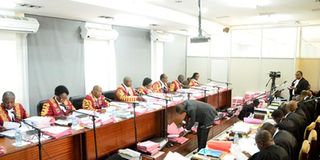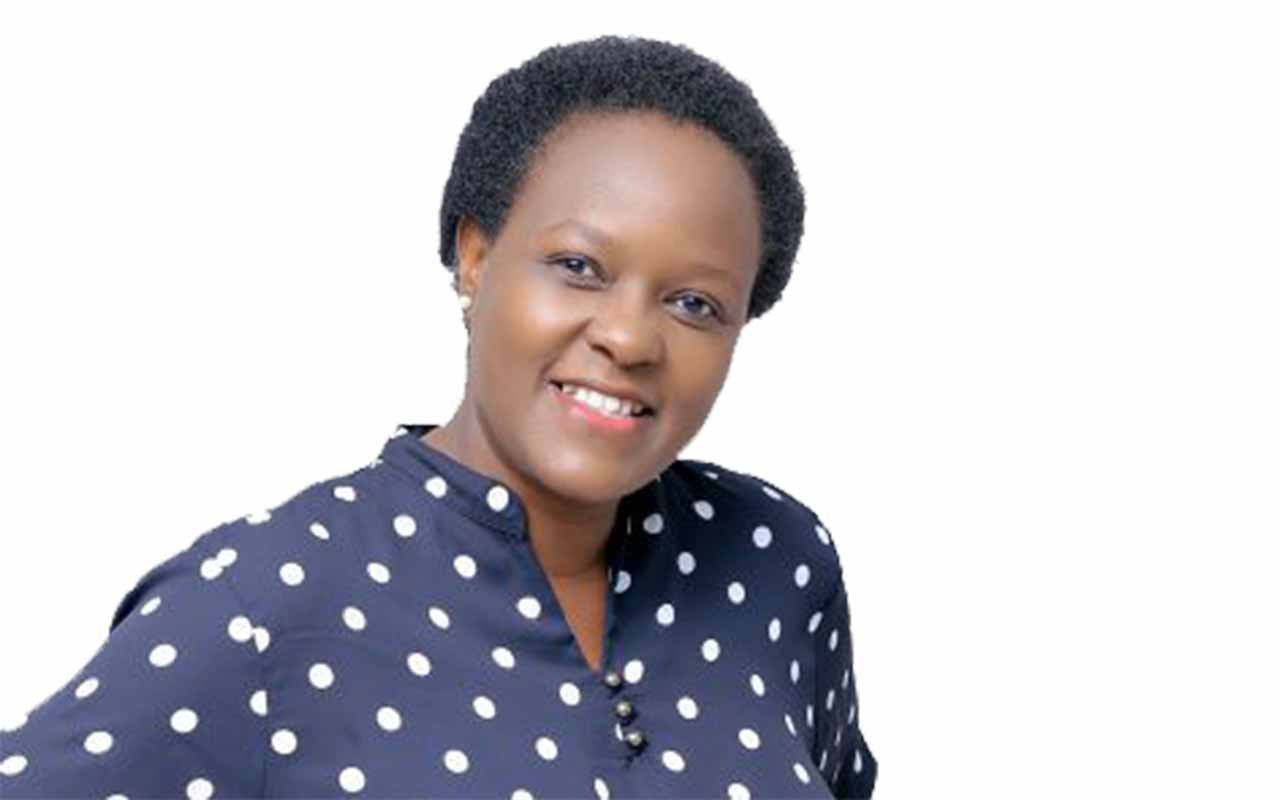What Ugandan courts should learn from Kenya

The Supreme Court of Uganda hears the Amama Mbabazi presidential election petition in March 2016. The justices, by a unanimous decision, dismissed the petition. FILE PHOTO
What you need to know:
Point of departure. The “substantial effect” provision and the reluctance to emphasise the general principles in the Constitution are the reasons why the Supreme Court of Uganda and Kenya will agree on almost everything except a declaration whether the election is null and void, writes Wandera Ogalo.
The Supreme Court summary judgments of Raila Odinga vs Uhuru Kenyatta and Independent Electoral and Boundaries Commission [2017], Kizza Besigye vs Yoweri Museveni and Electoral Commission [2001 and 2006] and Amama Mbabazi vs Yoweri Museveni and Electoral Commission [2016] have a lot in common. As a caveat, more will of course be known after the detailed judgment is out.
In all the four cases all the courts found the following:
(a) There was noncompliance with the provisions of the constitution (save the 2016 petition) and electoral laws in the conduct of the elections
(b) There was noncompliance with the principles laid down in the constitution and electoral laws
(c) The incumbent president was not guilty of any misconduct
There is only one major point of departure. The Supreme Court of Uganda has continuously held that the noncompliance with the provisions and principles of the Constitution and electoral laws did not affect the election in a substantial manner. On the other hand, the Supreme Court of Kenya held that the noncompliance had an impact on the elections.
The election of President Museveni was upheld on all three occasions while that of president Uhuru Kenyatta was declared null and void.
The provision which Supreme Court of Uganda has heavily relied on not to nullify the election of President Museveni, in part, reads as follows:
“The election of a candidate as President shall only be annulled if proved to the satisfaction of the court…. that noncompliance affected the result in a substantial manner.”
But Kenya has a somewhat similar provision. Section 83 of the Election Act reads in part:
“No election shall be declared void by reason of noncompliance with any written law relating to that election if it appears… that the noncompliance did not affect the result of the election.”
The principle is the same. The only difference appears to be the degree of noncompliance – affecting results in a substantial manner as opposed to affecting the results.
‘Relied on the constitution’
The Kenya Supreme Court appears to have heavily relied on the constitution, citing the principles of free and fair elections [Article 38 and 81], an impartial and neutral electoral commission [Article 81], national principles of governance [Article 10], and free expression of the will of electors [Article 30].
The difference between the two courts appears to be that while one puts emphasis on the supreme law of the land - the constitution of Kenya, the other places emphasis on an Act of Parliament [Presidential Election Act - Uganda].
The Supreme Court of Kenya appears to be saying that an Act of parliament which provides for noncompliance affecting the results will come second place to the constitution. In all the three judgments of the Supreme Court of Uganda, the Presidential Elections Act is very prominent.
And it is not as if the courts in Uganda have not had an opportunity to either do away with, or lessen the impact of this “substantial effect” law.
In the 2006 Besigye petition, Mr John Matovu, one of those who represented Dr Besigye, the petitioner, requested the Supreme Court to refer this problematic provision to the Constitutional Court for interpretation.
The Supreme Court not only dismissed the request for reference, but went as far as stating that the provision is not inconsistent with the Constitution of Uganda, thereby usurping the of powers of the Constitutional Court.
That was to prove a challenge later on when Dr Besigye filed a petition in the Constitutional Court seeking to have this provision declared unconstitutional. His petition was roundly dismissed in 2015. The court upheld this section as being consistent with our Constitution.
What is surprising is that the Supreme Court in Uganda is aware of the limitations this provision places on it. In the 2006 judgment, then Chief Justice Benjamin Odoki stated: “…there are problems which Parliament created and which make it difficult for courts to properly decide on the validity of an election of the President.”
Then Supreme Court Justice Wilson Tsekooko on his part stated that the section “appears to imply a license to a candidate to cheat or violate the law but do it in such a way that cheating ought not to be so much as to amount to creating a substantial effect on the result”.
Prof George Kanyeihamba, another of the justices of the Supreme Court then, was even more explicit when he stated:
“In my view, Section 59(6)(a) appears to have no other purpose than to force judges to consider and reflect on possible political consequences of their decision before making it.”
“It creates a subjective test for the manner in which judges may use their discretion and personal conscience in reaching decisions that may result in controversial consequences… I have endeavoured to emphasise the supremacy of the 1995 Constitution of Uganda. Where Parliament is empowered to make a law to amplify a constitutional provision, it must do so, intra vires. It must not make bad law. In my considered opinion, section 59(6) (a) of the Presidential Elections Act which compels judges to operate in the near impossible circumstances and choices I have described, is bad law.”
It is noteworthy that this provision is relatively new on our law books. It was introduced in 1995 prior to the 1996 general elections. Before that the applicable law was the National Assemblies Act 1958. That law did not have this “affecting the results in a substantial manner” provision.
This provision and the reluctance to emphasise the general principles in the Constitution are the reasons why the Supreme Court of Uganda and Kenya will agree on almost everything except a declaration whether the election is null and void.
Reaction
President Kenyatta reacted to the decision in a manner not unexpected.
To him, “six people” [meaning the Supreme Court] went against the will of the people. He refused to accept that what he called the will of the people had just been declared a nullity. He also failed to realise that in a democracy we are guided by rule of law and not will of the people.
The judiciary is a separate arm of government equal to the executive. Each arm of government has its functions and exercises them within its respective “sphere of influence”. When it does so, the other two arms must respect it. Then he threatened to sort out the judiciary after the elections!
The next utterances of His Excellency are frightening. He called judges of the Supreme Court “Wakora” (thugs, conmen), what Ugandans call “bafere”.
This is one reason why development has eluded us. Why would a serious investor bring money into a country [and create jobs for the youth] if he or she knows any disputes he may have will be adjudicated upon by conmen?
As a result we mostly receive ‘wakora’ investors. Those ready to bribes our public servants and steal from our countries. A national economy cannot be de-linked from the rule of law. And the message Kenyatta is sending to investors is for them to come with sufficient money in bribes.
Raila Odinga, Kenyatta’s challenger, must also take some blame. He went on television to call members of the Independent Electoral and Boundaries Commission criminals whose place is jail. If Odinga has evidence of crime, the best course is to refer the matter to the Director of Public Prosecutions.
For a man who spent six years in detention without trial because of bad governance, it is disheartening to hear him publicly undermine public confidence in a state institution.
Election observers
As Kenya Chief Justice David Maraga pointed out, an election is not an event but a process. The process commences months before polling day. But observers fly into the country at most one week to polling day and then allege to make decisions covering the whole period of registration, voters’ roll display, nominations, campaigns, etc. That is impossible.
There has been a joke doing the rounds in Uganda that observers have a template. They come, bask in the sun and visit a few polling stations on polling day. They then fill in the template with the name of the country, date, sign and deliver to whoever sent them and the rest of the world. Kenya’s Supreme Court has discredited observers.
The rotten egg on former US secretary of state John Kelly’s face is evidence of the need to rethink the election observation process.
In conclusion, I would state that the Supreme Court of Uganda should, like its counterpart in Kenya, place more emphasis on the provisions and principles of the Constitution.
The Ugandan court has in the past made findings that there was failure to comply with the provisions and principles of the Constitution. Nevertheless, it has upheld the elections because of some unworkable law.
It seems odd that one can breach the Constitution and get away with it, with blessings from the highest court in the land.
The writer is an advocate. He was part of the team that represented Dr Kizza Besigye during the presidential election petitions of 2001 and 2006, and an FDC politician.




